In 1939, The Pancake Review sent out a questionnaire to a number of prominent waffle eaters, asking them about waffles, maple syrup, and their breakfast-eating identities. While the questionnaire hasn’t been completely forgotten (right now, a Henry Darger type in Chicago hasn’t finished his response to the initial survey; an excerpt of this man’s ongoing 12,000 page work, In the Realms of the Waffles will be published next year by New Directions), we felt that these breakfast-related questions were rarely being asked of today’s waffle eaters. Considering that 2011 was a year of significant waffle eating and that most questionnaires are inherently pointless, we felt that it would be particularly relevant to update The Pancake Review’s questions.
In pursuing these vital questions with today’s breakfast experts, some figures were forced to recuse themselves or offer short answers to mimic recent breakfast austerity measures in Europe. Susannah Breslin pointed out that her gluten allergy prevented her from consuming them, even as she recognized that “everything hinges on waffles.” Elizabeth Crane Brandt professed to be “blind to this plight.” Lev Grossman insisted that he was “a French toast man.” Sheila McClear didn’t quite answer our questions, but she did inform us that she didn’t eat waffles in regular New York diners. “I will say I had a waffle at a semi-upscale breakfast place about three years ago,” reported McClear. “I was with my boyfriend, and I was cheerfully dousing it with syrup. He found this display so repulsive he actually walked. out. of. the. restaurant. on me.”
Ed Park claimed that he didn’t eat waffles anymore, but revealed that he sometimes eats a bit of leftover Eggos if they remain on other people’s plates. Dan Chaon said that he didn’t believe in the existence of breakfast, and, wishing to respect his beliefs, we didn’t press him further. Emma Straub pointed out that the New Kids on the Block “always have their after-parties at Waffle House restaurants, which tells you all you need to know about the state of American waffles.” She followed this astute observation with a Rita Coolidge quote.
But many of the waffle experts we consulted were both confident and comfortable with our questions, very frequently answering all of them.
Megan Abbott is most recently the author of The End of Everything.
Diana Abu-Jaber is most recently the author of Birds of Paradise. She is known for writing food-related prose that makes her readers very hungry.
Adrienne Davich is a writer, journalist, and editor based in Brooklyn.
Marcy Dermansky is most recently the author of Bad Marie.
Jesus Angel Garcia is the author of badbadbad.
J. Robert Lennon is most recently the author of Castle and Pieces for the Left Hand.
Michael Schaub is a writer and a critic in Austin.
Andrew Shaffer has claimed to be evil, but is also the author of Great Philosophers Who Failed at Love.
Alex Shephard and Eric Jett are the editors of Full Stop and are presently carrying out a questionnaire called The Situation in American Writing.
Jacob Silverman is a writer and critic in Brooklyn.
Laurel Snyder grew up in Baltimore, Maryland and now makes her haome in Atlanta. She does not miss scrapple, but neither does she bother with grits.
Sarah Weinman is an author, journalist, and freelance adventurer.
2011 was the year of the Sectarian Breakfast. There have also been massive protests in Greece, Spain, Britain, and most recently, the United States. Experts now say that the pancake/waffle conflict shows no sign of abatement in 2012. Does breakfast have a responsibility to respond to popular upheaval?
Marcy Dermansky: This is a serious issue. Breakfast does have a responsibility to respond to popular upheaval, now more than ever. My concern, rather than the waffle or the pancake, is the bagel. The bagel needs to made its presence known in Europe. I say this, currently living in Europe and feeling increasingly deprived.
Laurel Snyder: Honestly, my emotional response to the current situation is one of sadness and loss. I know that in my youth, my parents’ generation engaged loudly in the breakfast debate. They marched and demanded. They were such dreamers… but it always felt smart too, like an exchange of ideas. There was respect back then. Now it seems like we’ve lost sight of breakfast itself — and what it really means, what it stands for — almost entirely. I think it says something about this generation, about what America has become. Don’t you?
Sarah Weinman: Indeed it does. Breakfast preferences alter with time and as a result of economic hardship and revolutionary fervor. A waffle is more appropriate for boom times while pancakes thrive in recessions. But then it is also more likely for people to shout “let them eat pancakes!” So the conflict continues, unresolved.
J. Robert Lennon: I think breakfast has more integrity than that, don’t you? It can remain aloof.
Jesus Angel Garcia: Absolutely. In the United States at least, breakfast owes it to the people to listen to their needs. The people cannot survive on lunch and dinner alone.
Megan Abbott: Part of me wants to say that breakfast is in fact a part of that popular upheaval. It’s the thing we all share, after all. Where would we be without breakfast? How would anything begin? How would we know how to get through the day? That said, I rely primarily on legacy media to provide me with my information, and so I guess that marks me a dinosaur when it comes to breakfast considerations. But I am from Michigan.
Michael Schaub: It would be foolish not to. What we’re seeing in the world isn’t just, as some have posited, an inchoate anger. It’s not just a movement of bored young people who don’t fully understand the breakfast system. It’s the expression of population — several populations, actually — who have decided that enough is enough, that the old system is unsustainable. And they have a point — for too long the powers that be have forced their narrow-minded idea of breakfast on people who are just now deciding they want — they need — to think for themselves. If that means rejecting the eggs/bacon/pancakes model in favor of a gingerbread waffle with pecans, or even just a lowly Eggo, thrown in the toaster and eaten on the way to work, then that’s what is bound to happen. Huxley told us all we have the right to be unhappy, and if that means Toaster Strudels with alarmingly-colored frosting, then so be it. That is democracy; we expect no less.
Alex Shephard and Eric Jett: The best thing a waffle eater can do at a time of unrest is what he does best: eat waffles. In tumultuous times, people need something constant to remind them what really matters. Waffles provide that comfort. Sure, the way we take our waffles may change -— I gave up my beloved banana-nut waffles after reading Neruda’s “La United Fruit Co.” -— but as long as we continue to eat, life goes on.
Andrew Shaffer: Conflicts within the breakfast community are unfortunate but inevitable. Breakfast eaters tend to be emotionally engaged and passionate in their food preferences than non-breakfast eaters. The pancake/waffle conflict is minor compared to the eternal war between the breakfast eater and the non-breakfast eater. While skirmishes such as the pancake/waffle conflict break out from time to time (the ugly oatmeal/grits showdown during the Kennedy administration comes readily to mind), we need to be aware that pancake and waffle eaters are more alike than different.
Jacob Silverman: Yes, absolutely. For too long breakfast has allowed other meals to do the heavy-lifting when it comes for the lobbying of political rights and social change. If one takes the time to look at the burden borne by brunch during the aughts, frankly, it’s a scandal. We have much catching up to do.
Diana Abu-Jaber: Well, clearly this is the year of the Waffle Spring. After years of being marginalized — even vilified — as a kind of forbidding yet exclusive terrain, the “Waffle Street,” they’re making their way into the main stream, with all its inherent complexity.
Do you think that waffle eating should be directed towards a definite audience? If so, how would you describe this audience? Would you say that the audience for serious waffle eating (along with all related activities) has grown or contracted in the last ten years?
Jacob Silverman: We are long removed from the days when waffle eating was a serious social activity, when Buckley and Mailer ate waffles together on television, locked in mortal intellectual combat over which vintage of syrup reigned supreme. (Unsurprisingly, National Review, in its latter day jingoistic incarnation, has scrubbed from its archives all mention of Buckley’s preference for Canadian maple.) I do not expect the audience for serious waffle eating to recover. Like my friend Philip Roth, I anticipate that it will one day have all the popularity in this country of epic poetry. Unfortunately, that day may not be long in coming.
Jesus Angel Garcia: Like all good consumption, true waffle eating will always finds its audience.
Sarah Weinman: That’s a good question. The number of Waffle Houses have increased but the number of Eggo commercials are on the wane. I guess that means waffles are directed more towards those with disposable income, or who wish to celebrate their waffle-eating in public instead of heating up the frozen ersatz kind at home. So then: Waffles are So 1 Percent.
Laurel Snyder: I don’t think we can really talk about “the waffle” without first defining our terms. What is a waffle today? It isn’t the same waffle my grandmother knew. We eat waffles in our house, but they’re crappy waffles, frozen waffles. They’re an afterthought. We’re just to busy, or that’s what we say. I’d like to think there’s a bigger market out there for waffles, that we just need to find it. But with the current waffle, I’m not sure that’s true. I think of myself as a “waffle person” but half the time, I just eat a Stella D’oro Breakfast Treat on my way out the door.
Marcy Dermansky: I think waffle makers should be distributed at birth. How grateful I would have been if I had been given a waffle maker when Nina was born. I would make her waffles all the time. Instead, I have not made her a single waffle. She is two and a half years old.
Megan Abbott: I’ve never believed in eating only for oneself, for the sating of oneself. What is eating for if not for an audience? That won’t ever change. The way we do it -— the vehicle, the mode, even the time of day may change, but that longing won’t. Appetite is appetite.
Michael Schaub: It’s a bit of a double-edged sword. Direct waffle consumption toward the traditional audience — the affluent, Wall Street-employed Manhattanites who regularly line up at The Breslin or Fedora for their fix — and you risk extincting the doughy cake if and when the next economic meltdown occurs. But if you try to expand the audience, you risk turning something undeniably special into just another run-of-the-mill breakfast food. Still, I think it’s best to at least try to market the waffle to a slightly larger audience — while most blue-collar, lower-income Midwesterners won’t be willing to give up the foie gras and Almas caviar that constitutes their traditional morning meal, the survival of the cultural icon we call the waffle may well depend on it.
Alex Shephard and Eric Jett: Homemade waffles have certainly taken a hit from Eggos and other pop pastries, frozen or otherwise, but as the video of that riot over $2 waffle irons on Black Friday shows, there will always be a demand for quality.
Adrienne Davich: I think waffle eating is personality driven. People don’t love all waffles. They love particular waffles. Waffles with blueberries & whipped cream.
Diana Abu-Jaber: Look, the Pancake 99 percent has dominated our hearts and imaginations for far too long. Pancakes are Joe the plumber. I say it’s time to occupy the waffle maker — bring the batter to the people.
J. Robert Lennon: I don’t think about audience when I’m making waffles — I’m thinking about waffles. It’s about process for me — the process of baking, and the process of eating.
Do you place much value on the criticism your waffle eating has received? For the past decade we’ve seen a series of cuts to predominant pancake and waffle magazines, and in response, breakfast criticism has moved online. Do you think this move to the non-professional realm has made breakfast criticism more or less of an isolated cult?
Megan Abbott: I’ve always been a reluctant consumer in that regard. After you are made aware of how your waffles are received, how can one make waffles in a pure way again? Once we know what’s in them, everything changes, the waffles themselves change. You begin to think of them as a product. On the other hand, I count on these magazines to excite me about new waffles and occasionally even pancakes, so I rely on them, depend on them utterly. As one would on any cult.
Michael Schaub: I do what I do for the waffles, not the critics, and if they don’t get it, it’s their problem, not mine. I will say that the transition of waffle criticism from print to the Internet is not, in my opinion, a good thing. It’s become saturated with amateurs and bloggers, who think that just because they have an Internet connection and a (usually uneducated) point of view, their opinions are just as valid as the professionals. Those of us who have dedicated our careers to the art — yes, art — of waffles, even to the point of getting advanced degrees (in my case, Ph.D. in Breakfast Pastries, Dartmouth University, 2005), disagree.
J. Robert Lennon: I don’t read waffle criticism. I’m an eater, not a critic.
Sarah Weinman: Well, remember that the rise of breakfast also includes the meteoric commensurate rise of brunch, and lord knows that’s become quite the cult in rarified circles. But I’d like to see more breakfast criticism, not less! We need people to assert their opinions on the best of the best and pan the worst of the worst. Oh wait, I said “pan.” I think that’s a pun.
Laurel Snyder: I think it has value of a sort, because some interesting things have developed from the conversation, but yeah — it’s a closed loop. If you look at the comment threads, it’s easy to see people are just preaching to their own crowds, and occasionally seeking out a fight, to drive traffic, garner some attention.
Jesus Angel Garcia: Those who criticize breakfast wish they were eating breakfast all the time. Period. They’re fat and they’re hungry. You can’t fault them. We live in lean times. A time for foraging and hoarding. That said, it’s tough to take breakfast critics seriously, especially online where bagels with cream on their faces get more play than superdeluxe three — cheese omelettes with diced Kalamata olives, capers, cayenne pepper and cilantro. In print, this would never happen.
Marcy Dermansky: I fear that I am constantly criticized for my lack of waffle eating. I am ashamed to answer these questions. I fear the public outcry when my readership learns that I have never cooked my daughter a waffle. We recently ate freshly cooked waffles at a festival. They came with powdered sugar on top and were delicious.
Alex Shephard and Eric Jett: Thoughtful, constructive criticism should always be well received. If I’m chewing my waffles with my mouth open, by all means let me know. Unfortunately, democratization has, as always, been accompanied by mediocrity. With all the waffle products on the market now, it’s great that they can get individual attention from the smaller presses (no pun intended), but a green webzine writer who has spent one morning watching me eat is not going to provide the type of insights that one could get from the pages of Waffle Aficionado, which I, like many, was sad to see dissolve. I remember reading their review of Wells’ first Belgian waffle baker when I was in high school and being blown away. When was the last time a blog blew you away?
Adrienne Davich: Speaking from no experience, no. The move seems to have made breakfast less of an isolated cult. However, breakfast seems more fractured. I guess there’s more free breakfast too. I’m not sure how I feel about that as an eater.
Jacob Silverman: I do take such criticism to heart, and it may be my downfall as a breakfast eater. I find neither shame nor pride, only a weary sadness, in admitting that many are the days I have wasted rending my clothes and weeping over the vicious barbs of a breakfast blogger (pajama-wearing and basement-dwelling, no doubt!). Through these spells, I have torn apart many wardrobes, soaked all of my handkerchiefs to their very monograms, while Frederick, my Chantilly cat, eyes me, baffled. What can be wrong with him, he must be thinking. If only I had the meows to communicate my torment. Alas, it is bottomless.
Diana Abu-Jaber: Ho hum. Everyone who’s ever held a fork or photographed a plate of cheese grits now claims they’re a breakfast critic! I say, show me the bacon. Apple-smoked.
Have you found it possible to make a living by eating the types of waffles you want to, without other work? Do you think there is a place in our current economic system and climate for waffle eating as a profession?
Michael Schaub: Sadly, I’m unable to support myself solely by waffle eating. There was a time, of course, when one could do so — when the nation treasured its breakfast heritage more. Then came the Reagan administration, which abolished the Department of Breakfast and Brunch. (President Obama’s promise to reinstate the department has, sadly, proved to be a false one.) And without the DBB, the profession has faded into, in my case, a hobby. I’m not asking anyone to feel sorry for me. I’m asking them to feel sorry for America.
Andrew Shaffer: One could, theoretically, make a living eating waffles, but what kind of life would that be? Even if the waffles were given to you, it’s a terrifying prospect to even contemplate. While it’s true that you are unlikely to starve by eating waffles, man cannot live on waffles alone. You must also have butter. You must have Vermont maple syrup. You must have non-dairy whipped cream topping. You must have sliced strawberries. You must have crushed pecans. And, if you are doing it correctly, chocolate chips. For these reasons, it is simply not possible to comfortably eat waffles without a steady source of income in the current economic climate.
Laurel Snyder: It’s a hard question for me to answer. I’m hardly a committed full-time waffle person. My husband makes more than I do. I’m more of a hobbyist. I don’t take it as seriously as I should. This is a chicken-and-egg situation though. Am I not doing it full-time because my waffles are sub-par, or are my waffles sub-par because I’m not taking them seriously enough? Who can really say?
Jesus Angel Garcia: Are we being honest here? If so, let’s admit the obvious: Waffles aren’t real food. But that doesn’t mean anyone with a dream shouldn’t be given the same opportunities to succeed as defense contractors, investment bankers and drug dealers. That’s the United States of America I know and love.
Marcy Dermansky: It occurs to me now that perhaps the time has come for me to be a professional waffle maker. It is time for me to have a marketable skill. Thank you for the suggestion.
Megan Abbott: I’ve heard of some waffle eaters believing it can bring them millions, or that it can bring them the waffle-eating life they always dreamed of, as portrayed in popular television programs, where they will be portrayed by David Duchovny, or in motion pictures, such as those of Woody Allen, or fantasies that just, quite frankly, aren’t realistic, like appearing in a Vogue in sexy outdoors gear or having their image splayed across a massive billboard in Times Square. I’ve had dreams like that too. But it’s not the real world.
Alex Shephard and Eric Jett: Of course there will always be a few stars who are able to make a living off waffles. But the majority of us will increasingly have to extend our palates to other meals. There will be more chicken salad sandwich critics, more Salisbury steak critics. Many will even take jobs at IHOP or Denny’s. But some of our best critics were already working there anyway.
Adrienne Davich: I am glad you asked this question. But what about America’s waffle and pancake servers? The tipped minimum wage in many states has stagnated at $2.13 an hour. That means pancake and waffle servers across America are living below the poverty line, sometimes starving, while waffle eaters naval-gaze and intellectualize about breakfast values! At least waffle eaters eat. Have you been to IHOP lately? The people who cook, serve, and clean up your breakfast don’t have health care either.
Sarah Weinman: As I pointed out before, waffles are more for boom times. So when the economy rebounds, there will be much more waffle-eating among the proletariat. Needless to say I’ve supplemented my waffle-eating with a ton of frittatas, parfaits and other petit dejeuner foods to get by. A girl’s gotta do what a girl’s gotta do, right?
Jacob Silverman: No. The waffle eating economy has been torn asunder, and I assign equal blame to IHOP and the Huffington Post. As to how I sustain my lifestyle, that is between me and my court-appointed attorney.
Diana Abu-Jaber: You really have to hustle if you want to make it in the breakfast rat race. I, for one, have had to subsidize my waffle arts by offering hot iron workshops — mainly online, of course.
J. Robert Lennon: Well, I used to be able to make a living with the waffles, but at some point in the mid-2000’s I realized I would have to go on the job market, and now I’m the Director of Waffle Studies at Cornmeal University.
Do you find in retrospect, that your waffle eating reveals any allegiance to any group, class, organization, region, religion, or system of thought, or do you conceive of it as mainly the expression of yourself as an individual?
Diana Abu-Jaber: I discussed waffle allegiances at length with Christopher Hitchens, Richard Dawkins, and Mother Theresa. The jury is still out.
Alex Shephard and Eric Jett: I like to think that my breakfast menu is relatively eclectic, but if I’m being honest, when it’s 8 a.m. and I’m sitting at the kitchen table in my pajamas with a long day ahead of me, I’m a committed continentalist. After all, waffles, with their trademark grids, are the breakfast food most directly influenced by Descartes. Give me something sweet, something with meat, some coffee, and some juice. (Perhaps I inherited this from my grandmother, who was born in Belgium. She’s American now—also dead). We critics like to split hairs over how many pancakes make a short stack, what diameter makes a silver dollar, but at the end of the day—or the beginning, I should say (an old joke, I know)—we have more in common than not. Breakfast satisfies basic human needs—hunger, nourishment, community—and when all is said and done, what is a crêpe, really, but a thin pancake? And what is a pancake but a Euclidean waffle?
Sarah Weinman: 100 percent individual preference, though now I am might curious about the correlation between waffle-eating and Objectivism. Perhaps a study can be commissioned on this post-haste?
Laurel Snyder: Can I say both? I’m generally a fence sitter. I think of my waffle-life as deeply personal, an extension of my daily life, but how can I separate that from my life as a Jew? Am woman? A mother, above all else? And those things certainly define my politics…
Jesus Angel Garcia: You’re forcing my hand, Mr. Champion. I can’t honestly answer this question. I don’t belong in this conversation. I’m a charlatan, a fraud, but I am flattered that you think of me as a waffle eater. Truth to tell, for breakfast I only eat French toast (and granola).
Marcy Dermansky: It seems like I march alone, eating waffles only when they are available at street festivals in Germany. Truth to be told, I rarely eat waffles or pancakes. Recently, my friend Tami made me pancakes for breakfast and they were so good. Usually, when I go to brunch, I order an omelet.
Megan Abbott: I think if all of us looked inside, we’d see surprising attributes about ourselves that can explain the lure of waffle eating, or particular kinds of waffles. A kind of longing for an imagined idea about American breakfasting we’d like to be a part of. An American breakfast that perhaps never really existed. But it’s very personal, very private—and yet we like to attach larger ideological resonance to it. Maybe because it makes us feel part of something now. Are we the relics of lost civilizations? Are we the last vanguard against The End? Or are we the new revolutionaries, erecting a new challenge to society? All three of those options may all feel infinitely sexier than admitting we just like waffles. They make us feel good. They are delicious.
J. Robert Lennon: I think my waffle making and eating has really strengthened my connection to the Inuit people, and to white Southerners.
Michael Schaub: Of course I try to keep an open mind, and be objective as possible, with regard to my waffle eating. But my heritage necessarily influences my breakfast habits, and I see no point in trying to change that. I’m Southern, so I often put pecans on my waffles. I was raised Catholic, so I usually accompany my waffles with whiskey. I grew up in the suburbs, so quite often I find myself using Aunt Jemima “syrup” instead of the real, hardcore Vermont stuff. And I’m a male in my thirties, so I almost always eat waffles while viewing pornography.
Adrienne Davich: I think waffle eating without any allegiance whatsoever is impossible. Marguerite Duras said, “Every waffle eater is a moralist. It’s absolutely unavoidable. A waffle eater is someone who looks at the world and the way it works, someone who takes a close look at things every day and reports what she sees, someone who represents the world, the event, for others.”
Jacob Silverman: My waffle eating belongs to me and me alone. And any agribusiness conglomerate that wishes to sponsor me.
How would you describe the political tendency of American waffle eating, as a whole, since 2001? How do you feel about it yourself?
J. Robert Lennon: Politics come and go, waffles are forever.
Michael Schaub: There’s no doubt that 9/11 changed everything. My point of view is that of, I believe, most Americans: if we give up on waffles, if we toss our waffle irons in a box and leave it outside a Goodwill store, if we — God forbid — start eating pancakes, then the terrorists have won. The French toast lobby would like us, of course, to adopt a policy of appeasement. As a real American, I would not.
Diana Abu-Jaber: Now that we’ve got the plodding old biscuit-gummers and egg-boilers out, I’m hopeful that a bold, new, imaginative approach to buttering and syruping may once more hold sway over our fair nation.
Adrienne Davich: Moralizing. Demoralizing. Uncertain.
Sarah Weinman: If waffles are for the 1 percent, as I theorized already, then it’s all about the plutocracy, baby. And money trumps politics.
Laurel Snyder: I don’t think people even notice the waffles in their lives very much. But when they no longer have waffles, they’ll notice. The waffles will become more and more rarified, more underground. One day people will wake up and say, “Where have all the waffles gone?” But by then it’ll be too late.
Jesus Angel Garcia: Since 2001? It’s not French toast!
Marcy Dermansky: Waffle eating is a subversive act. For years when I lived in the South, I went to Waffle House, usually not for breakfast, often in the middle of the night. I rarely ate a waffle or saw others eating waffles. I would order the hash browns, smothered and covered. I don’t think that has changed. In the war against terror, it is best not to eat tagines, delicious as they are.
Megan Abbott: Honestly, I’m surprised to be asked. These questions are rarely posed to those of us who have been placed firmly in the toaster oven category of waffle eating. I’m not sure why that is, precisely, but I try not to think about any of these things when I eat. Maybe those placed in the “artisan” or “slow waffles” categories do. Or maybe it’s just a quality that emerges in the eating, or doesn’t, without a plan or intention. Maybe at its best it is truly organic. Even for us Eggos.
Alex Shephard and Eric Jett: The passionate responses to Michelle Obama’s efforts to restructure the food pyramid, as well as her stance against cereal mascots, are, I think, emblematic of the situation in American breakfast. Yes, many of us take breakfast for granted, but it takes only the slightest change to remind us how much is at stake. Personally, I’m of the mind that breakfast is the most important meal of the day, and if it’s that important, then it should probably be the best meal of the day as well. And, for me, the best is always homemade. Just ask my mom.
Jacob Silverman: To paraphrase Gore Vidal, it’s quite clear that the Bush junta sapped the political life from waffle eating. Its condition is much like blintzes after the Harding administration, and I fear that it faces a similar path towards irrelevance.
Over the past ten years, America has been in a state of constant war with its breakfast. This war has extended to fronts throughout the world. Have you considered the question of your opinion on an unending war on breakfast? What do you think the responsibilities of waffle eaters are in general are, in the midst of unending war?
Marcy Dermansky: I think waffle eaters have to realize that they have lost the war. Waffles take too long to make and waffle irons are too expensive for the working class. I would like to start a movement to increase the consumption of New York bagels around the world.
J. Robert Lennon: Look, man, my responsibility is to three things: the waffle, the butter, and the syrup. People who want to repurpose breakfast for their petty political aims should just sleep in and dump their burdens on cheese sandwiches and reheated coffee.
Sarah Weinman; I haven’t considered that question, to be frank. But if I did consider it I’d implore regular waffle eaters to be kinder and gentler to their pancake-eating brethren. The conflict may continue but there’s no need for bloodshed. Not even bloody steaks to go along with the eggs alongside the pancakes and/or waffles!
Laurel Snyder: Just to remember, to value, to continue to engage, to continue to both produce and consume. I want to be part of the dialogue, whatever it is. I’ve promised myself I’m going to try harder this year, do more. But then — I think I said that last year. I don’t know. I just don’t know.
Jesus Angel Garcia: As I understand it, America has been at war for 99 out of the last 100 years. This war on breakfast is nothing new to anyone with a basic grasp of history. Now that Obama and the Congress have passed the NDAA, which legalizes indefinite detention for American citizens on American soil for “breakfast transgression,” the definition of which is subject to the whimsical palate of any administration that happens to occupy the White House, no one is safe. The bottom line? If you want to eat — waffles, pancakes, even oatmeal for God’s sake! — if you want your children to be able to choose their own breakfast foods, you need to take a stand now before it’s too late.
Megan Abbott: Well, in the end, the world spins on, but what we need to remember is that we each have a personal relationship with breakfast, one that is primitive and essential. That goes back to our first moments in the world, as babies, as children. We need breakfast because it’s how we’ve always understood the world. Because it reminds us we are not alone because we all need it. And that’s true whether we like our breakfast in pancake form, or waffles, toaster or otherwise. Or any form at all. We need it. It feeds us. Call me old-fashioned, call me a throwback, call me a hopelessly romantic but I really do believe it is the most important meal of the day.
Michael Schaub: “Keep Calm and Carry On” has become a cliche ever since the British poster was made popular again earlier this century. Nevertheless, the sentiment is no less true. We have been through other wars on breakfast. We have sent our troops thousands of miles away, to Antwerp and Brussels, when the Belgian waffle was threatened by the German strudel and the Italian frittata. We have won these wars, and we have become better and stronger because of it. Our responsibility as waffle eaters? Keep the faith. Whether you top your waffles with fried chicken, whipped cream, syrup, butter, whatever — we are all in this together. And it is only through togetherness we can win. In the words of the great American statesman Benjamin Franklin, “This waffle is delicious! Now to find a buxom French whore.” And that’s as true today as it was then.
Alex Shephard and Eric Jett: Breakfast is over when the plate is clean and not a second before. Every crumb of waffle, every drop of syrup. The effects of an incomplete breakfast may not be immediately apparent, but eventually, some time before lunch, that hunger pang is going to strike, and it is going to strike with a vengeance. To ensure the productivity of our work (no trips to the vending machines) and the satisfaction of our lives, it is the responsibility of every man, regardless of what he eats, to clear his plate.
Adrienne Davich: I think waffle eaters have a responsibility to the truth.
Jacob Silverman: As is the American tendency, the war on breakfast is unlikely to end; it will only assume new forms. We can only bide our time, raise our meek, syrup-slathered fists in protest, and wait for a Predator drone to pick us off as we cram our faces with so many doughy cakes.
Diana Abu-Jaber: Freedom fries, Ed, that’s all I’ll say. Freedom fries.
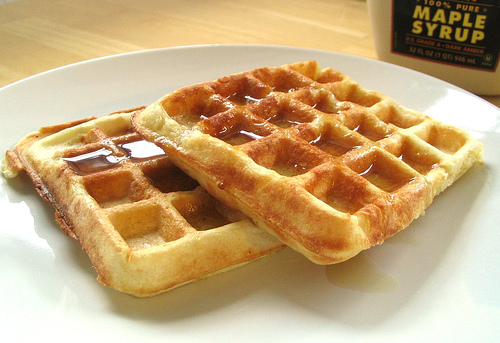
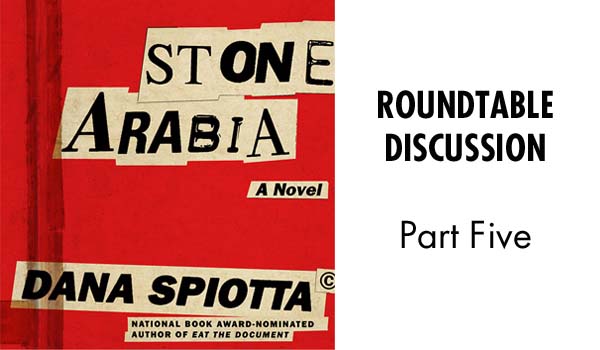
 Now doesn’t that sound a bit like Nik’s Chronicles? This got me thinking about whether Nik’s Chronicles represent a new lofty patriotism, or whether the act of plucking a lily (Paula’s question causing me to plunge further, not unlike Ada’s documentary filmmaking) from the vast swaths of electronic fallow is really what Spiotta is remarking upon. If the Battle of Stone Arabia can’t be remembered, if Colonel John Brown’s heroic actions stand no chance of being committed to memory (and we’re arguably living in a nation where our political figures commit more historical gaffes than ever before), then does Nik stand a chance?
Now doesn’t that sound a bit like Nik’s Chronicles? This got me thinking about whether Nik’s Chronicles represent a new lofty patriotism, or whether the act of plucking a lily (Paula’s question causing me to plunge further, not unlike Ada’s documentary filmmaking) from the vast swaths of electronic fallow is really what Spiotta is remarking upon. If the Battle of Stone Arabia can’t be remembered, if Colonel John Brown’s heroic actions stand no chance of being committed to memory (and we’re arguably living in a nation where our political figures commit more historical gaffes than ever before), then does Nik stand a chance?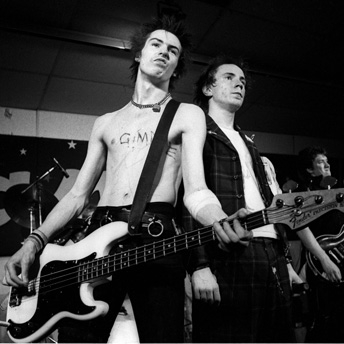 On the other hand, I don’t have much sympathy for Nik. He may or may not be talented in an accessible way. (And I don’t award him much for his ability to mimic various elements of the creativity business.) I am not certain whether he was easily thwarted by any resistance to his ambitions (on the verge of success, his band was apparently sabotaged by one of those sharpies with which the record business is infested), but his nearly three decades as a barkeep in a Los Angeles dive bar is, at best, evidence of a pathetic lack of self-preservation. His substance abuse, which he refers to as his consolation, provides ample evidence that, whatever the obsession to fantasize a life of creativity means in his life, it does not offer (much) relief for what ails him. Did Nik kill himself? By that point in the story, I had stopped caring.
On the other hand, I don’t have much sympathy for Nik. He may or may not be talented in an accessible way. (And I don’t award him much for his ability to mimic various elements of the creativity business.) I am not certain whether he was easily thwarted by any resistance to his ambitions (on the verge of success, his band was apparently sabotaged by one of those sharpies with which the record business is infested), but his nearly three decades as a barkeep in a Los Angeles dive bar is, at best, evidence of a pathetic lack of self-preservation. His substance abuse, which he refers to as his consolation, provides ample evidence that, whatever the obsession to fantasize a life of creativity means in his life, it does not offer (much) relief for what ails him. Did Nik kill himself? By that point in the story, I had stopped caring.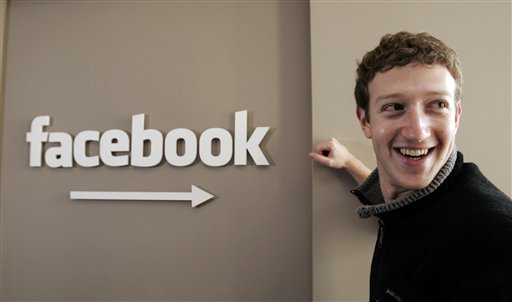
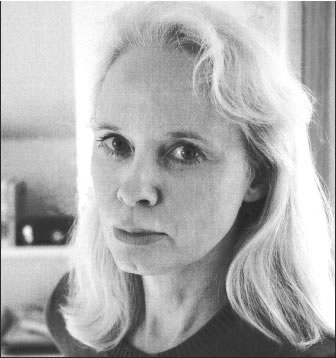 Paula: Interesting!
Paula: Interesting!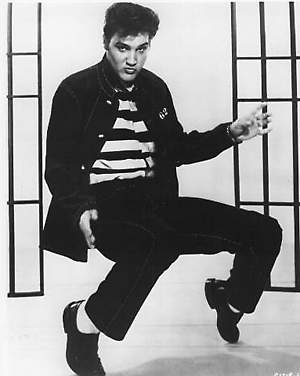 I want to talk about cliche, kitsch, and rock music. From the very first sentence, Nik’s story is explicitly linked to the dominant narratives of the “golden age” of rock ‘n’ roll, the 1960s — “he changed in one identifiable moment.” A Hard Day’s Night is cited by a number of groups (esp. the seminal LA band, The Byrds) as a formative moment in their evolution; similarly, John Lennon and Paul McCartney have linked their decision to begin playing music to a moment just after seeing Jailhouse Rock (“now that’s a good job,” John Lennon would say later about Elvis). The sudden appearance of a guitar, and it’s immediate transformation into an object of obsession, is also inked onto the pages of rock lore. Over the course of Stone Arabia, Spiotta links Nik’s experience — his actual experience (the manipulative managers, the strange left turns, the substance abuse) and his Chronicled experience (the motorcycle crash, “every person who did see them live seemed to have formed a band of their own,” the substance abuse) to dominant (and very cliched) narratives that characterize so many biopics and biographies about rock music, both popular and underground. Interestingly, these narratives, manipulative and often tacked on as they are, are what define the “authenticity” of ’60s and ’70s rock music. It’s why The Killers grew mustaches and went out into the wilderness to record their second album, why The Kings of Leon will always remind you of the fact that they’re all related, and how they grew up traveling the Bible Belt with their preacher father. At this point in time they’re kitsch narratives — harkening back to a time that never really existed, imitating a narrative that was already mostly a lie.
I want to talk about cliche, kitsch, and rock music. From the very first sentence, Nik’s story is explicitly linked to the dominant narratives of the “golden age” of rock ‘n’ roll, the 1960s — “he changed in one identifiable moment.” A Hard Day’s Night is cited by a number of groups (esp. the seminal LA band, The Byrds) as a formative moment in their evolution; similarly, John Lennon and Paul McCartney have linked their decision to begin playing music to a moment just after seeing Jailhouse Rock (“now that’s a good job,” John Lennon would say later about Elvis). The sudden appearance of a guitar, and it’s immediate transformation into an object of obsession, is also inked onto the pages of rock lore. Over the course of Stone Arabia, Spiotta links Nik’s experience — his actual experience (the manipulative managers, the strange left turns, the substance abuse) and his Chronicled experience (the motorcycle crash, “every person who did see them live seemed to have formed a band of their own,” the substance abuse) to dominant (and very cliched) narratives that characterize so many biopics and biographies about rock music, both popular and underground. Interestingly, these narratives, manipulative and often tacked on as they are, are what define the “authenticity” of ’60s and ’70s rock music. It’s why The Killers grew mustaches and went out into the wilderness to record their second album, why The Kings of Leon will always remind you of the fact that they’re all related, and how they grew up traveling the Bible Belt with their preacher father. At this point in time they’re kitsch narratives — harkening back to a time that never really existed, imitating a narrative that was already mostly a lie.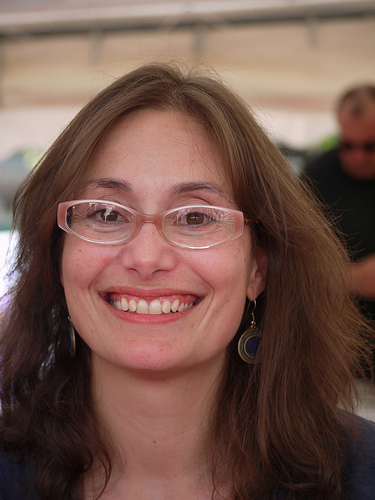 Thank you to Ed for doing this roundtable. I am so grateful for all the time everyone put into the discussion. I knew this was a book that would elicit complicated reactions, but I was so pleased to see people found so much to discuss. What thoughtful and interesting responses. How generous you all are to read the book so carefully. With so many books in the world, and so many other things demanding attention, a novelist is extremely lucky to get serious readers.
Thank you to Ed for doing this roundtable. I am so grateful for all the time everyone put into the discussion. I knew this was a book that would elicit complicated reactions, but I was so pleased to see people found so much to discuss. What thoughtful and interesting responses. How generous you all are to read the book so carefully. With so many books in the world, and so many other things demanding attention, a novelist is extremely lucky to get serious readers.